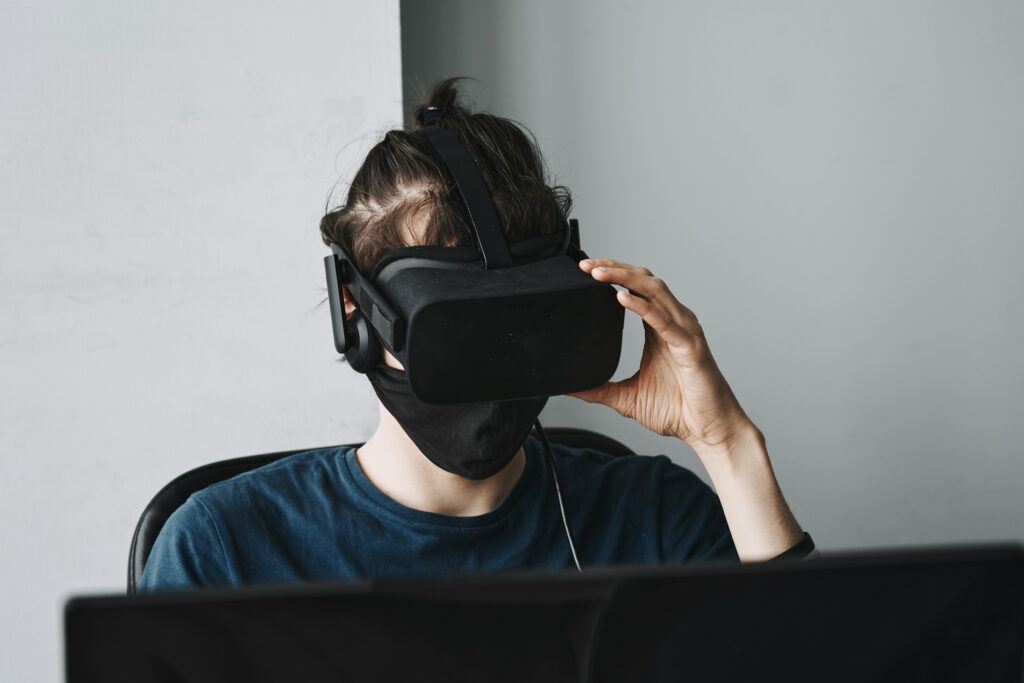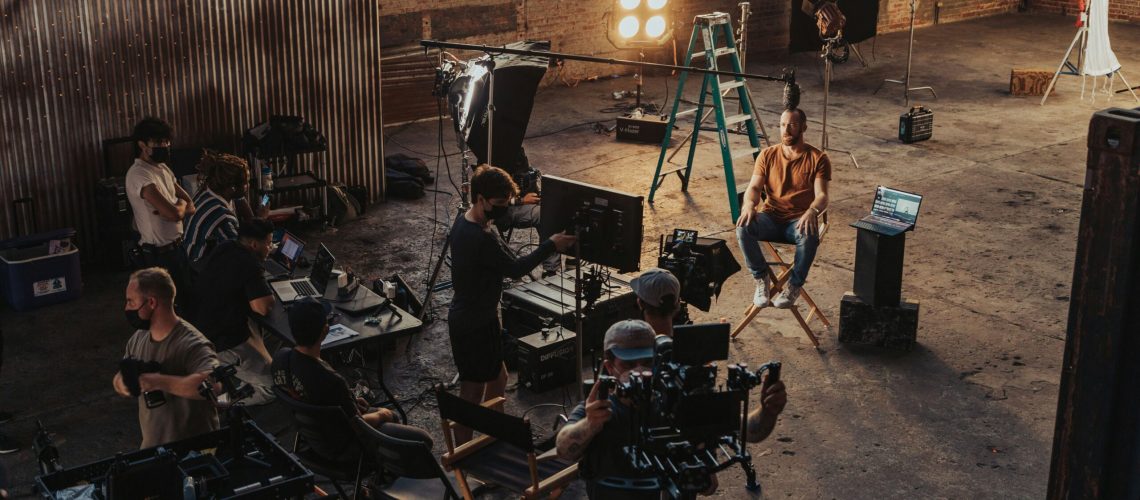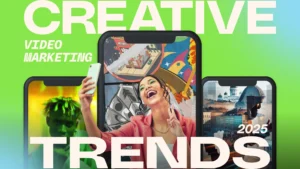The film industry, renowned for its fusion of art and technology, is undergoing a paradigm shift with the integration of artificial intelligence (AI). From scriptwriting to post-production, AI is revolutionizing film production, enabling higher creativity, efficiency, and precision. As this technology evolves, its impact on the film industry deepens, offering filmmakers new ways to push creative boundaries.
At the forefront of this revolution is HUSTL Media, a leader in Las Vegas video production. By integrating AI, HUSTL Media enhances both the technical and creative aspects of film production in Las Vegas, empowering filmmakers to tell more compelling stories. In this blog, we’ll explore how AI is reshaping film production, its impact on post-production, and the future of filmmaking with AI. We’ll also discuss the challenges and ethical considerations, and the importance of collaboration between AI and creative minds in Las Vegas video productions.
The Rise of AI in Film Production

The process of making a film is complex, with each phase—from pre-production to post-production—requiring meticulous planning and execution. Traditionally, pre-production involved time-consuming tasks such as script analysis, casting, location scouting, and scheduling. However, AI is now streamlining these processes, allowing filmmakers to focus more on creativity and storytelling.
AI in Script Analysis and Development
One of the most significant ways AI is revolutionizing film production is through script analysis and development. AI-powered tools can analyze scripts to predict their commercial success, suggest improvements, and even generate dialogue or story ideas. These tools use vast databases of existing scripts, box office data, and audience preferences to provide insights that can guide filmmakers in crafting more engaging narratives.
For example, AI can analyze a script’s structure, pacing, and character development, comparing it with successful films in the same genre. This analysis can help identify potential weaknesses in the script and offer suggestions to enhance its appeal. Moreover, AI can predict how certain scenes or dialogues might resonate with audiences, enabling filmmakers to make data-driven decisions during the script development phase.
HUSTL Media’s Innovative Approach
HUSTL Media is at the cutting edge of utilizing AI in film production. By incorporating AI-driven tools into their pre-production workflow, HUSTL Media enhances the efficiency and effectiveness of the filmmaking process. Their innovative approach allows them to identify potential challenges early in the production cycle, optimize resources, and ensure that the final product meets both artistic and commercial goals. By embracing AI, HUSTL Media is setting a new standard for what’s possible in modern filmmaking.
AI’s Influence on Post-Production

Post-production is where the magic of filmmaking truly comes to life. It involves editing, visual effects, sound design, and color grading—all of which require a keen eye for detail and a deep understanding of the film’s narrative and tone. Traditionally, these tasks have been labor-intensive, requiring skilled professionals to spend countless hours perfecting each frame and scene. However, AI is now transforming the post-production landscape, offering tools that enhance both efficiency and creativity.
AI in Editing and Visual Effects
AI-powered editing tools are becoming increasingly sophisticated, capable of automating many of the repetitive tasks involved in film editing. For instance, AI can automatically sort through hours of raw footage, identifying the best takes and even suggesting cuts that align with the film’s narrative arc. This not only speeds up the editing process but also allows editors to focus on the creative aspects of their work.
In the realm of visual effects (VFX), AI is enabling filmmakers to create more complex and realistic effects with greater ease. Machine learning algorithms can analyze and replicate the movement of natural elements such as water, fire, and smoke, making it possible to create stunning visuals that would have been time-consuming and expensive to achieve manually. Additionally, AI can assist in tasks like rotoscoping and motion tracking, reducing the workload for VFX artists and allowing them to concentrate on more creative endeavors.
Cost-Effectiveness and Efficiency
The integration of AI into post-production not only enhances the creative process but also offers significant cost savings. By automating time-consuming tasks, AI reduces the amount of manual labor required, thereby lowering production costs. This efficiency is particularly beneficial for independent filmmakers and smaller production studios, who may have limited budgets but still aspire to create high-quality films.
HUSTL Media’s Cutting-Edge Technology
At HUSTL Media, the adoption of AI in post-production has led to remarkable advancements in their filmmaking capabilities. By leveraging AI-driven editing and VFX tools, HUSTL Media can deliver polished, high-quality films faster and more efficiently than ever before. Their commitment to embracing new technologies ensures that they remain at the forefront of the industry, offering clients innovative solutions that set their films apart from the competition.
Enhancing Audience Experience with AI
As AI continues to reshape the filmmaking process, it is also having a profound impact on the way audiences experience films. Today’s viewers expect more personalized and immersive experiences, and AI is playing a key role in meeting these expectations.
Personalization and Engagement
AI algorithms can analyze viewer data to create highly personalized content recommendations, ensuring that audiences are presented with films and shows that align with their tastes and preferences. Streaming platforms like Netflix and Amazon Prime Video have been pioneers in using AI to tailor content recommendations, but the technology is now being used in more innovative ways.
For example, AI can analyze a viewer’s emotional responses to certain scenes or genres and adjust the content accordingly. This level of personalization enhances the viewer’s engagement with the film, making the experience more immersive and enjoyable. Moreover, AI can be used to create interactive films where the audience’s choices influence the storyline, offering a new level of engagement that was previously unimaginable.
HUSTL Media’s Efforts
HUSTL Media is committed to leveraging AI to create content that not only captivates but also resonates with audiences on a deeper level. By analyzing viewer data and feedback, HUSTL Media can tailor their films to meet the specific preferences of different audience segments. This approach ensures that every film they produce offers a unique and engaging experience, further solidifying their reputation as a leader in the film industry.
Challenges and Ethical Considerations
While the benefits of AI in filmmaking are clear, the integration of this technology also raises several challenges and ethical considerations. As AI becomes more prevalent in the industry, it is essential to address these issues to ensure that the technology is used responsibly and ethically.
Potential Challenges
One of the primary challenges of AI in filmmaking is the fear of losing the human touch. Filmmaking has always been a deeply creative and collaborative process, and there is concern that AI could diminish the role of human creativity in favor of algorithm-driven decisions. Additionally, there is the risk of over-reliance on AI, where filmmakers might prioritize data-driven insights over artistic intuition.
Another challenge is the potential for bias in AI algorithms. Since AI systems are trained on existing data, they may inadvertently perpetuate existing biases in the film industry, such as gender or racial stereotypes. Ensuring that AI systems are designed and trained to minimize bias is crucial for promoting diversity and inclusivity in filmmaking.
Ethical Implications
The ethical implications of AI in filmmaking extend beyond the creative process. There are also concerns about data privacy, especially when it comes to analyzing viewer behavior and preferences. Filmmakers and studios must be transparent about how they collect and use data, ensuring that they respect the privacy of their audiences.
HUSTL Media’s Commitment
At HUSTL Media, we take these challenges and ethical considerations seriously. We are committed to using AI in a way that enhances the filmmaking process without compromising creativity or ethical standards. Our approach is rooted in the belief that AI should complement, not replace, human creativity. By fostering a culture of collaboration between AI and creative professionals, we strive to create films that are both innovative and ethically responsible.
Collaboration and Innovation in the Film Industry
The integration of AI into the film industry is not just about technology; it’s about collaboration and innovation. To fully harness the potential of AI, it is essential to foster a collaborative environment where technology and creativity can coexist harmoniously.
Collaboration Between AI and Filmmakers
AI offers filmmakers new tools to enhance their storytelling, but it is the collaboration between AI and human creativity that truly drives innovation. By working together, filmmakers and AI can explore new narrative possibilities, create more immersive visual experiences, and push the boundaries of what is possible in film.
HUSTL Media’s Role in Fostering Innovation
HUSTL Media is dedicated to fostering a culture of collaboration and innovation in the film industry. By integrating AI into their workflow, they empower filmmakers to explore new creative avenues while maintaining the artistic integrity of their work. This collaborative approach ensures that every film they produce is a testament to the power of innovation and creativity.
The Future of AI in Filmmaking

As AI technology continues to advance, its impact on the film industry is likely to grow even more significant. The future of AI in filmmaking holds exciting possibilities, from fully AI-generated films to new forms of interactive and immersive storytelling.
Predicting Future Trends
In the coming years, we can expect AI to play an even more integral role in the filmmaking process. Advancements in natural language processing and machine learning will likely lead to more sophisticated AI tools that can assist in everything from scriptwriting to directing. Additionally, the rise of AI-generated actors and virtual sets could revolutionize the way films are made, offering filmmakers unprecedented creative freedom
Impact on the Film Industry
The integration of AI into filmmaking will likely lead to more personalized and immersive viewing experiences, as well as more efficient and cost-effective production processes. However, it will also require the industry to adapt to new challenges and ethical considerations. Filmmakers will need to strike a balance between embracing new technologies and preserving the human elements that make films truly resonate with audiences
HUSTL Media’s Vision
At HUSTL Media, we envision a future where AI and human creativity work together to create films that are not only visually stunning but also deeply meaningful. We are committed to staying at the forefront of AI innovation, continually exploring new ways to enhance the filmmaking process while maintaining the artistic integrity of our work
Empowering Filmmakers with AI
One of the most exciting aspects of AI in filmmaking is its potential to empower filmmakers. By providing new tools and insights, AI allows filmmakers to unleash their creativity and storytelling abilities like never before.
Unleashing Creativity
AI can handle many of the technical aspects of filmmaking, freeing filmmakers to focus on the creative elements of their work. This allows for greater experimentation and innovation, as filmmakers can explore new narrative structures, visual styles, and storytelling techniques without being constrained by traditional production processes.
HUSTL Media’s Commitment to Empowerment
HUSTL Media is dedicated to empowering filmmakers through the use of AI technology. By providing access to cutting-edge tools and resources, we enable filmmakers to push the boundaries of their creativity and bring their visions to life. Whether it’s through AI-driven script analysis, editing tools, or personalized audience engagement strategies, we are committed to helping filmmakers tell their stories in the most compelling and impactful way possible.
Conclusion
The impact of AI on the film industry is undeniable. From transforming pre-production and post-production processes to enhancing the audience experience, AI is changing how films are created and consumed. While challenges and ethical concerns remain, the benefits of AI in filmmaking are immense.
HUSTL Media, a leader in video production in Las Vegas, is embracing AI to enhance both the technical and creative aspects of filmmaking. By integrating AI, we’re empowering filmmakers to tell more compelling and innovative stories. As we move forward, we are excited about the possibilities AI offers and remain committed to staying at the forefront of this revolution.
For filmmakers and studios looking to explore AI’s potential, HUSTL Media, one of the top production companies in Las Vegas, is here to help. Together, we can harness AI to create films that captivate audiences and stand the test of time.
To book our services, kindly send us an email at Art@HUSTLMedia.com or directly call us at (702) 980 -9620. You may also learn more about us and our campaigns by visiting our website – HUSTL Media.




